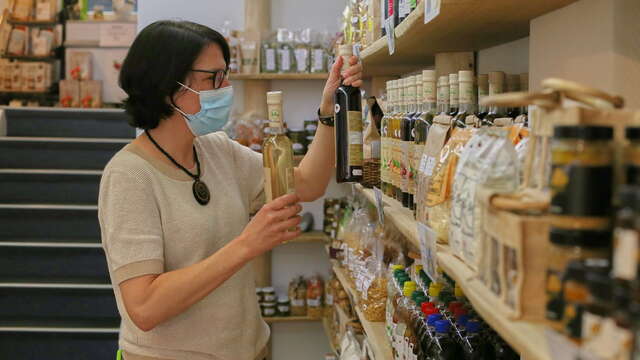Sustainability in St.Gallen
With instead of against nature

Can a city be sustainable at all? Many people in a confined space, dense traffic and fast consumption on every corner. The general conditions pose a number of challenges. For an environmentally friendly coexistence, the measures must therefore be all the more creative. And there are quite a few of them in the city of St.Gallen.
If you look, you will find opportunities in St.Gallen to live sustainability on a small scale. Whether in the unpackaged store "Ganzohni", where you can fill your own Tupperware with food, or in the "RegioHerz", where the name says it all and the food comes from farm stores in the region. And if the "RegioHerz" is closed, there are farm stores on the outskirts of St.Gallen where you can also shop outside regular opening hours.
The extent of unnecessary waste of resources in everyday life is particularly evident in individual consumption - be it food, clothing or everyday objects. In the throwaway society, broken things are disposed of, not repaired. To counteract this, St.Gallen has "Share Gallen", a platform with networks on which resources are shared, exchanged and lent. Sharing is caring - also in the city of St.Gallen.
With e-mobility and a solar community to become a smart city
In addition to the individual, however, the entire society, economy and politics are also called upon. With its "Smart City" strategy, the city of St.Gallen is also pursuing efforts on a large scale to reduce its ecological footprint. The goal of the "Smart City" - or smart city - is the efficient use of resources, which is to be achieved with various projects such as the solar community, the promotion of e-mobility or the construction of entire smart city districts.
The fact that housing and mobility have an influence on sustainability is also evident from the housing strategy published in 2020. The living space in St.Gallen is growing, working distances are short, thus individual mobility and thus CO2 emissions can be reduced.
"Living space in St.Gallen is growing, work commutes are short, so individual mobility and thus CO2 emissions can be reduced."
"Must reorganize our relationship with nature"
Since 2008, St.Gallen has held the "Energy City" award. This is due, among other things, to the local district heating network. This brings climate-neutral heat to local homes. This type of renewable heat production has met with great approval among the population of St.Gallen, says Fredy Zaugg, Head of the Environment and Energy Department of the City of St.Gallen. "This network makes a lot of ecological sense and should be affordable for everyone."
By 2050, the city of St.Gallen wants to cover its own needs in a completely climate-neutral way. According to Fredy Zaugg, this is realistic and technically feasible. Until then, however, there are still a few areas that need to be addressed: "We have to reorganize our relationship with nature and learn to live together with it and not just use it. Ultimately, it is up to each individual how sustainable St.Gallen is, will be, and should remain.






















